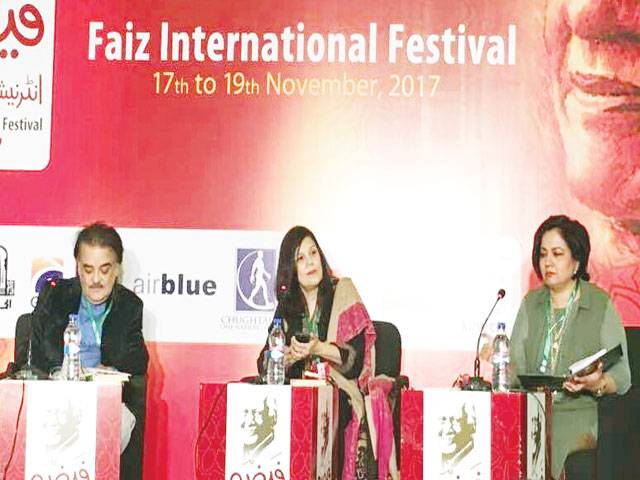LAHORE-Anjum Qureshi has conveyed to Pakistani women to stand firm and fight against all the problems and obstacles in their way to achieve success in the society.
A known Punjabi poet with distinct expression, Ms Qureshi was reciting her poems during a discussion at Faiz International Festival on Sunday.
“Larna mera kar ni ma-aay – main kyoun manaa har ni ma-aay,[ Why should I surrender before oppression when fighting against injustice is written in my fate” was the upshot of her message to fellow women. “Sub Warq Teri Yad kay—Reading from Literature” was the topic of the discussion.
Recently emerged on country’s literary stage, Anjum Qureshi is writer of three Punjabi poetry books – Main tay Amaltas, Main Labhan Chali and Doja Pasa. She regretted women are often considered a sexual commodity and could not find right place despite their struggle of decades. She chose defiant topics in her poetry and added a lot to the Punjabi literature landscape. Her other concern which she pointed out in her verses was the discrimination towards girls to get education.
“Babay menu ve pharnay paa day—Chacha menu ve kitaban le-ya day.
Jay Pharn likhan di jach sikhan—tay apni qismat aap likhan. [Mother please send me to school. Uncle kindly bring some books for me. I will write my own destiny if I would be an educated lady].”
She told the gathering that her poetry was the part of curriculum of MA Punjabi in Indian Punjab.
Afshan Sajjad , an educator, poet and author of an Urdu poetry book, Jo Dil pe Guzarti hay, read Faiz Ahmed Faiz poetry and highlighted his message of revolution. She regretted the discrimination towards the national language in the society, saying Urdu was no more an important subject in elite educational institutions of Pakistan. Ms Afshan also read a short story “Shanu” of Krishan Chandar, a prolific writer who penned over 20 novels and 30 collections of short stories and scores of radio plays in Urdu.
Prof Hasan Shahnawaz Zaidi, a renowned artist and designer, was the other speaker. He also chose a sketch of late Krishan to read it for the audience. Male chauvinism and his typical approach towards women, fear of death, love, care and affection between a sister and brother and wife’s possessiveness for her husband were discussed in the Krishan’s sketch.






